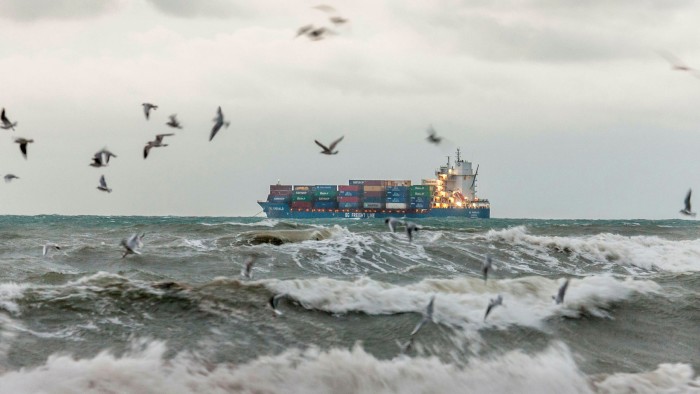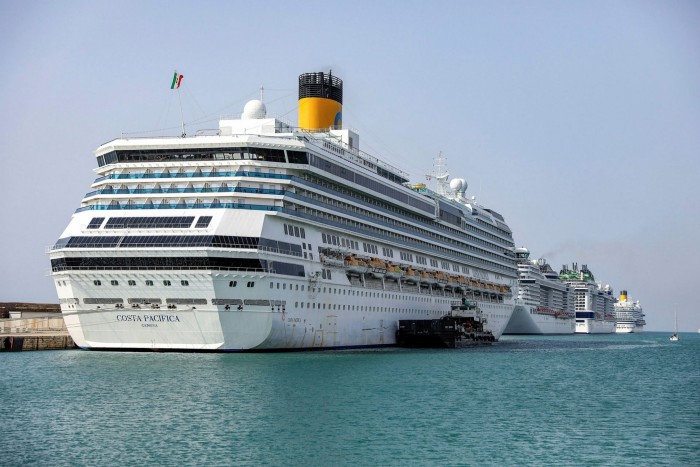Shipping faces storm over fuel emissions

Roula Khalaf, Editor of the FT, selects her favourite stories in this weekly newsletter.
In 1609, Dutch lawyer Hugo Grotius wrote Mare Liberum (The Freedom of the Seas), arguing that all nations should be free to use the seas for commerce. Ever since, maritime trade has been built on minimal state interference in oceangoing matters.
As a consequence, shipping — despite generating almost 3 per cent of global greenhouse gas emissions — was, like aviation, kept outside of the Paris Climate commitment to keep global warming within 2C and ideally 1.5C.
However, some lawyers argue it should not have been. And, today, the stance espoused by Grotius is in the balance, as governments seek ways to get the shipping sector to reduce its greenhouse gas emissions.
The International Maritime Organisation is the UN body mandated to regulate shipping and is tasked with forging an agreement between 178 member states. In 2018, it pledged the sector would cut greenhouse gas emissions by at least half by 2050, compared with 2008 levels. But this ambition was lambasted by the UN secretary-general António Guterres last month for falling well short of the Paris goals.
The controversy reflects how shipping — from cruise ships and tankers to fishing trawlers — is difficult to decarbonise because the sector underlies so many countries’ economic prosperity. Plus, cleaner marine fuels such as green ammonia, hydrogen and methanol are not available at scale.
Optimists hope COP26 can serve to give the IMO an impetus to move more quickly. Simon Bergulf, director of regulatory affairs at Maersk, the world’s largest shipping company, hopes shipping is discussed at the event’s world leader’s summit day. “The absolute best outcome would be a very clear signal from all nations that shipping needs to be addressed,” he says.

The IMO must decide by 2023 whether to raise its climate change ambition. But the right signals at COP could bring forward a decision for the sector to set a target of net zero by 2050.
Others believe COP26’s role in bringing pressure to bear on the shipping sector has already been a success. The International Chamber of Shipping, the industry lobby group, signalled in October its support for net zero by 2050. Last month, nine large international companies including Amazon vowed to ship their goods using only zero-emission shipping by 2040.
“This would not have happened without COP; it focuses the mind,” says Johannah Christensen, chief executive of the Global Maritime Forum.
Yet others in the industry are less upbeat, given that shipping is low on the political agendas of many states.
“The political salience of shipping is very, very low,” says Tristan Smith, associate professor at UCL Energy Institute in London. “It’s so hard to raise it up because, to get senior political understanding of the discussion at the IMO, you have to go into the weeds.”
Shipping’s trickiest regulatory problems centre on proposals for market-based measures such as carbon levies, which put a price on polluting and are seen by many as necessary to make new alternative fuels cost-competitive. The controversy is: who gets the money raised and what can they do with it?
A growing pool of industry insiders is more bullish on less contentious measures. These include mandates to increase the use of alternative fuels and decrease fossil fuels, and the UK government’s Clydebank Declaration to establish maritime green corridors.
But Aoife O’Leary, chief executive of campaign group Opportunity Green, says these mechanisms lack the virtue of global carbon taxation: a pot of money can compensate developing countries for the hit to their economies from more expensive shipping.
While questions linger over the IMO’s ability to create consensus, disquiet is fomenting over EU plans to extend its emissions trading system to international shipping.
That has put the trading bloc on one side of a potential battle over who has the right to demand emission reductions and reshape the flows of global trade. China, India, Bangladesh and Panama made a blistering submission to the IMO last month, directed against the EU regulatory drive without mentioning it, calling it “unfair and unjust” and an “exploitative market-driven mechanism”.
Jan Dieleman, president of Cargill’s ocean transportation business, says fragmentation over carbon taxation is an inevitability: “We’re going to see more local schemes. It’s a pain worth having to get going.”
Others think the fallout will be lasting. Paddy Rodgers, director of Royal Museums Greenwich and former chief executive of Euronav, a Belgian tanker group, says: “What we’re going to end up with is a breakdown and a deglobalised response.” Regardless of the scope and form of future regulation, Rodgers adds that the shipping industry is in denial about the consequences of climate change action. “We’re not tinkering around here, we have to change the way we live to survive . . . Shipping is whistling in the dark thinking that globalisation will remain.”
Climate Capital

Where climate change meets business, markets and politics. Explore the FT’s coverage here.
Are you curious about the FT’s environmental sustainability commitments? Find out more about our science-based targets here
Comments